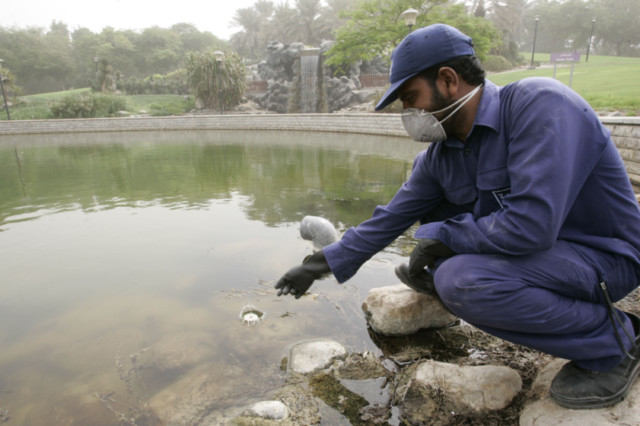
Dubai: A spate of enquiries about mosquitoes as winter sets in has prompted a pest control firm to raise awareness about what needs to be done to control their spread.
Sean Baker, managing director of National Pest Control (NPC), said although the UAE is malaria-free, the public has a responsibility to ensure mosquitoes don’t breed in homes.
He said: “The World Health Organisation is satisfied that there is no local transmission of malaria by mosquitoes in the UAE. With the combined efforts of municipality pest control sections and other government programmes, as well as professional pest controllers, the UAE is free of indigenous mosquito-borne diseases.”
Preventive measures
He said: “NPC regularly gets calls from many parts of the country to control mosquitoes which breed rapidly in reed marshes, swamps, lakes, fish ponds, unused swimming pools, open dustbins, drain pits and wells.”
Even a bucket with stagnant water left for a period of time can be a breeding ground. “So a single undisturbed breeding source can potentially create major ongoing issues for a neighbourhood, as adult mosquitoes can fly considerable distances,” he said.
NPC’s technical expert Dinesh Ramachandran said: “Often a toy left in the garden can hold stagnant water as it is regularly fed by irrigation sprinklers. Preventing mosquito breeding by removing or covering stagnant water is the key. It’s likely you won’t even need to use any pesticide.”
He said homes that have ornamental lakes or ponds should ensure they are designed to prevent mosquito breeding. “Keep the sides vertical with no pebbles or encroaching vegetation that can provide harborage for the mosquito larva.
Predatory larva eating fish can also be introduced. If you know of neighbouring properties with bodies of water, unused swimming pools causing mosquito infestations inform the property owner or municipality. If you can’t locate breeding sources and if you still face an issue, get a professional pest controller to do a technical inspection. If the source is located, it’s likely pesticide will not be needed.”
However Baker said in some cases, the only option can be to apply non-toxic organic chemicals to control breeding along with fogging in open spaces.
Last year, Dubai Municipality implemented a massive fish breeding project to combat mosquito larvae that breed in irrigation basins and water pools.
The project was a marked departure from the conventional method of eliminating mosquito larvae using chemical pesticides which could have had a negative impact on the environment and public health.
Baker said mosquitoes can spread diseases such as malaria, western Nile fever and dengue fever which kill tens of thousands of people worldwide every year.
“They are a real danger in parts of Asia and Africa and even some parts of the Middles East. People travelling to infected destinations are at risk of acquiring these diseases. So they should check with their GP and take necessary precautions.”













